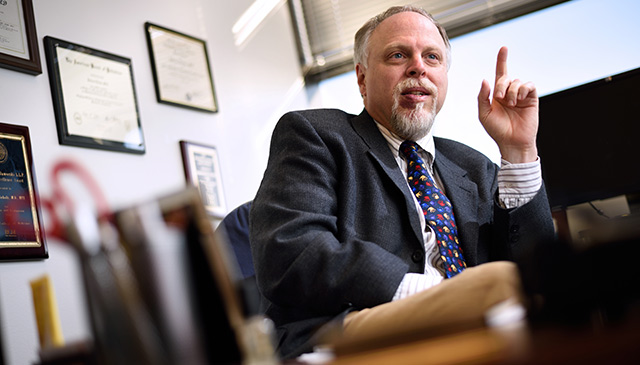 As chief of the newly created section of Public Health Pediatrics at Texas Children’s – the nation’s largest and first public health section within a children’s hospital – Dr. Christopher Greeley has devoted much of his resources and time toward developing a one-of-a-kind, community wide program aimed at child abuse prevention.
As chief of the newly created section of Public Health Pediatrics at Texas Children’s – the nation’s largest and first public health section within a children’s hospital – Dr. Christopher Greeley has devoted much of his resources and time toward developing a one-of-a-kind, community wide program aimed at child abuse prevention.
“As a board certified child abuse physician, I kept seeing children after they were harmed,” said Greeley, who also is a professor of pediatrics at Baylor College of Medicine. “It would be a great day if no one were hurt. And the only way for that to happen would be for the health care team to spend more time on prevention.”
Greeley uses this analogy to illustrate his point:
Imagine standing by a river and watching kids floating by. You pluck them out of the river to rescue them. But you need to go upstream to find the break in the fence that is allowing the kids to fall into the water. Going upstream to find and correct the cause of problems is the model of public health.
“We have been spending all of our time scooping kids out of the river, and now we’re developing a program, a strategy to start going upstream,” Greeley said. “We will always take care of these kids, but part of what our team does is focus on socioeconomic factors that place kids and families at risk in the first place.”
Launched in October 2015, the Public Health Pediatrics section has two components – child abuse pediatrics and the Center for the Study of Childhood Adversity and Resilience (CARE). Both components work together to engage the community around perceived risk factors and improve the trajectory for children of abuse and neglect.
The child abuse pediatrics program focuses on four main areas:
- Excellence in clinical care: About 2,500 suspected victims of abuse and neglect are evaluated annually at Texas Children’s and the Children’s Assessment Center (CAC) in Houston. Care is provided at Texas Children’s Main Campus and planned for the new Texas Children’s Hospital The Woodlands campus. Consultative services are available at Texas Children’s Hospital West Campus. The program provides medical support to CACs in Houston and Brazoria County. Because children in the foster care system are at risk of abuse, Texas Children’s is developing a foster care clinic.
- Training and education: Baylor and Texas Children’s have three doctors in training in an accredited fellowship in child abuse pediatrics, one of the largest such programs in the country. Besides education for medical students and the greater Houston medical community, a training program is being developed for post-doctoral public health practitioners. An outreach program trains members of the community on signs and symptoms of child abuse.
- Scholarship and new knowledge: Clinical research varies from early recognition of abuse to improving mental health services for children in foster care.
- Community presence: The program’s interdisciplinary team of physicians, nurses, social workers and public health practitioners help primary care physicians and nonprofits who care for abused and neglected children and are available to civic groups, church groups and YMCAs.
In conjunction with child abuse pediatrics, the main focus of CARE is community-level research to identify, promote and implement strategies to prevent adverse childhood experiences such as poverty, violence, inequality, homelessness, and lack of mental health, education and nutrition.
For instance, to help relieve parental stress and improve children’s outcomes, the launch of the upWORDS program at Texas Children’s teaches parents how to improve the quantity and quality of language spoken with their children, which has been known to increase brain development and positively impact their child’s future.
The Public Health Pediatrics section is also working with nonprofit communities, city and county agencies to develop partnerships and strategies to help families cope with other issues including postpartum depression, violence, and food insecurity or hunger in Houston.
“Improving the circumstances that cause adverse childhood experiences is a long-term complex undertaking that must be adapted to fit each community,” Greeley said. “But the section of Public Health Pediatrics is ready to do whatever it takes to improve the lives of children.”
Texas Children’s Physician-in-Chief Dr. Mark W. Kline who recruited Greeley to head this new section applauds the success and foresees the future growth and far reaching impact of this program.
“As a transformative figure in the Department of Pediatrics, Greeley will inspire a generation of public health-oriented pediatricians-in-training who, in turn, will populate programs across the country,” Kline said. “His program is a prime example of the things that we are doing that other pediatrics departments in the U.S. can replicate.”

